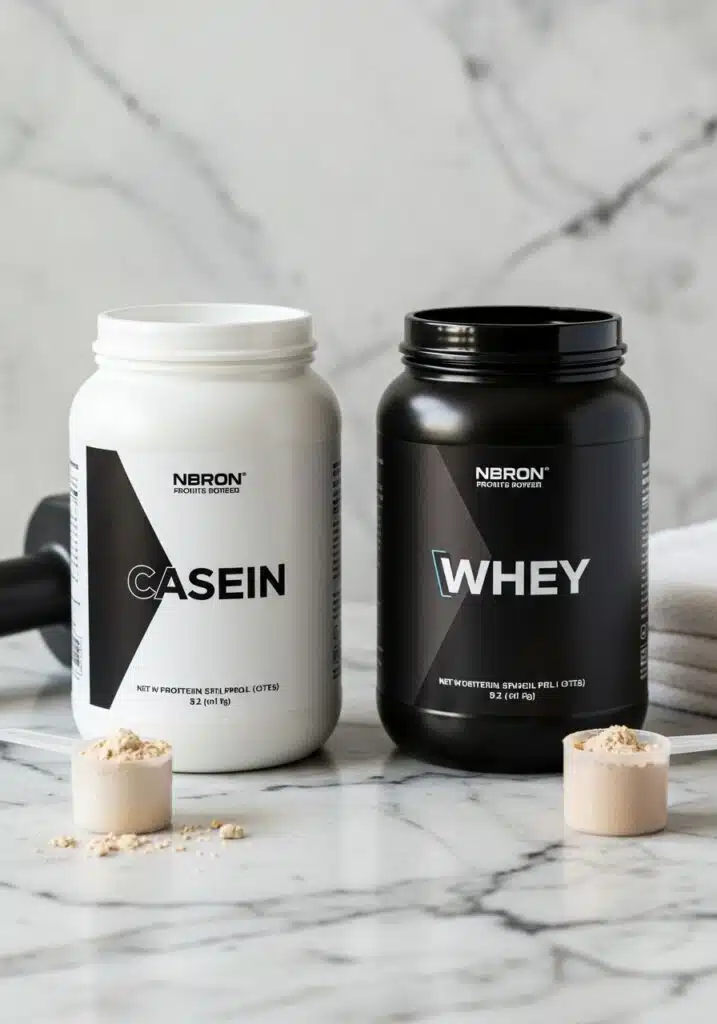Casein vs Whey, it’s one of the biggest debates in the fitness world. If you’ve ever stood in the supplement aisle wondering which tub will actually help you build muscle or lose weight faster, you’re definitely not alone.

Protein is the foundation of every fitness goal, whether that’s sculpting lean muscle, boosting recovery, or shedding fat without losing strength. But here’s the catch: not all proteins work the same way. The type of protein you choose can change how your body digests, absorbs, and uses those nutrients to rebuild muscle tissue.
This guide breaks down the science behind casein vs whey, comparing everything from digestion speed and amino acid profiles to how they impact satiety and body composition. By the end, you’ll know exactly when to use each one, and why both might deserve a spot in your nutrition plan.
What Are Casein and Whey Proteins?
Before diving into the details, let’s start with the basics. Both casein and whey come from milk. When milk is processed to make cheese, it naturally separates into solid curds (that’s casein) and liquid whey. Both are complete proteins, meaning they contain all nine essential amino acids your muscles need to repair and grow.[1]
The biggest difference lies in how they behave inside your body. Whey protein digests quickly, giving your muscles a fast hit of amino acids, perfect after workouts. Casein protein, on the other hand, digests slowly, releasing amino acids over several hours. This slow release makes it a steady fuel source that supports recovery even while you sleep.[2]
Because they’re both derived from dairy, they share similar nutrient profiles, high in protein, low in fat, and virtually free of carbs, but their timing and effects on muscle synthesis are what set them apart. If you’re interested in exploring different protein sources for cooking and baking, check out our guide to the best protein powder for cooking and baking.
Digestion & Absorption: Fast vs Slow Proteins
Here’s where things get interesting. Whey protein is known as a fast-digesting protein, which means your body absorbs it rapidly, usually within 60–90 minutes. That quick absorption triggers a sharp spike in amino acid levels, which is great for jump-starting muscle protein synthesis (MPS) right after a workout.[3]
Casein protein, on the other hand, behaves completely differently. It forms a gel-like substance in your stomach, slowing down digestion and creating a steady stream of amino acids that can last up to 6–8 hours. That’s why many people call casein the “nighttime protein.”[4]
So when you compare casein vs whey in terms of digestion speed, whey wins the “fast fuel” category, ideal post-workout. Casein takes the “long burn” title, keeping your muscles nourished during rest or fasting periods. It’s like comparing a quick energy boost to a slow-release battery.[5]
Amino Acid Profile & Muscle Protein Synthesis (MPS)
Both casein and whey deliver all essential amino acids, but their ratios differ slightly. Whey is rich in branched-chain amino acids (BCAAs), especially leucine, which plays a major role in kick-starting muscle growth. Research consistently shows that whey triggers a faster, more powerful MPS response than casein, making it ideal right after resistance training.[6]
Casein, however, takes a different approach. It provides a smaller but more sustained amino acid release. Think of it as a marathon, not a sprint. Over time, that slow, consistent supply of amino acids helps reduce muscle breakdown, particularly when you’re in a calorie deficit or sleeping.[2]
If your goal is muscle gain, most fitness enthusiasts and trainers suggest using whey protein post-workout and casein protein before bed, a combo that supports both short-term synthesis and long-term muscle repair. For more high-protein meal ideas that support muscle building, explore our cottage cheese for fitness guide.[4]
Preventing Muscle Breakdown & Overnight Repair
We all know how frustrating it is to work hard in the gym and still wake up feeling flat or sore. That’s where casein protein really shines. Because it digests slowly, it continuously feeds your muscles with amino acids throughout the night, preventing catabolism, the breakdown of muscle tissue when your body runs out of fuel.[8]
Whey, on the other hand, is more like a quick repair tool. It helps right after training but doesn’t last long enough to protect your muscles while you sleep. That’s why many athletes and bodybuilders mix a scoop of casein before bed or during long gaps between meals.[2]
This isn’t just bro science either. Studies show that consuming casein at night increases overnight muscle protein balance, helping you recover faster and wake up stronger. In the casein vs whey battle for overnight repair, casein takes the win, no contest.[4]
►For a delicious bedtime protein option, try our chocolate protein pudding recipe made with casein powder for sustained overnight muscle support.
Satiety, Appetite Control & Weight Loss
When it comes to weight loss, the winner isn’t about speed but satiety. Protein keeps you full, and casein protein does this best thanks to its slow digestion. That gradual amino acid release means you stay satisfied longer, reducing the urge to snack or overeat.[9]
Whey protein, while lighter and quicker to digest, still boosts satiety in the short term and helps preserve lean muscle during a calorie deficit. Many people find that combining both, whey earlier in the day and casein later, keeps hunger and cravings in check.[10]
So if your goal is to lose fat without feeling deprived, casein vs whey isn’t an either/or decision. They complement each other. Use whey when you need a quick protein hit, and casein when you want lasting fullness, especially before bed. For more weight-loss friendly high-protein recipes, check out our cottage cheese recipes for weight loss.
Using Casein & Whey Around Workouts
Timing matters more than most people realize. The best way to use whey protein is right after your workout when your muscles are primed to absorb nutrients. It quickly delivers amino acids to jump-start recovery and muscle repair.[11]
Casein protein, on the other hand, fits better before long fasting periods, like bedtime, or when you know you’ll go hours without eating. It’s your slow-release option, keeping your muscles fed over time.[4]
►A lot of people in the fitness community swear by combining both: whey post-workout for a fast hit, and casein before bed for sustained recovery. Honestly, that strategy covers all your bases without complicating your supplement routine.[12]
Body Composition Changes: Fat Loss + Lean Mass Gains
Here’s where the science gets exciting. Multiple studies have compared casein vs whey in real-world conditions, and results show that both can improve body composition, but in slightly different ways.[13]
Whey protein tends to promote faster lean muscle gains due to its strong effect on muscle protein synthesis. Casein, meanwhile, helps preserve lean tissue during caloric restriction and increases fat oxidation (the body’s process of burning fat for fuel).[14]
For anyone aiming to build muscle and lose fat simultaneously, alternating or combining both proteins gives the best of both worlds: whey for quick growth stimulus, casein for steady recovery and metabolic support. It’s a combo that truly delivers results over time.[12]
►If you’re focused on muscle building specifically, check out our guide on cottage cheese for fitness for additional high-protein strategies that complement your supplement routine.
Potential Drawbacks & Side Effects
No protein supplement is perfect. While both casein and whey are generally safe, they can cause issues for people with dairy or lactose intolerance. Whey isolate contains less lactose than casein, so it’s often easier on digestion.[13]
Casein can also feel heavier, and some people don’t like its thick texture. On the flip side, whey can cause bloating in those sensitive to fast-digesting dairy proteins.
►The takeaway? Listen to your body. Try both in small amounts, see how you feel, and adjust accordingly. Choosing between casein vs whey shouldn’t be about hype, it’s about what your body responds to best.[15]
Which One Should You Choose?
If you’re looking for muscle gain, whey protein is your go-to right after workouts. If you’re more focused on weight loss or long-lasting satiety, casein protein might be your best bet.
But here’s the truth, both serve different purposes. Whey works fast; casein works slow. One’s like a sprint, the other a marathon. Most people who get great results use them strategically rather than exclusively.[16]
At the end of the day, consistency matters more than the brand of protein you buy. Meeting your daily protein target through a mix of whole foods and supplements will always be the biggest factor in reaching your goals.[17]
expert tips
►Use whey protein right after workouts for quick recovery.
►Take casein protein before bed or between long gaps for sustained nourishment.
►Combine both if you want round-the-clock muscle support.
►Stay hydrated, both proteins draw water during digestion.
►If you’re lactose-sensitive, try whey isolate or micellar casein for gentler digestion.
►Don’t rely solely on supplements, pair them with lean meats, eggs, and dairy for a balanced diet.
Practical Tips: How to Use Casein & Whey Effectively
Many fitness-focused home cooks mix casein into high-protein desserts (like puddings or overnight oats) and use whey in smoothies for faster absorption. It’s practical, affordable, and keeps your diet exciting.
►For more creative high-protein recipes, explore our cottage cheese chocolate mousse or protein pancakes with cottage cheese for delicious ways to meet your protein goals.
Nuances and Further Considerations
While casein vs whey discussions often focus on short-term effects like digestion speed and muscle recovery, the long-term picture is more nuanced. Research shows that over weeks or months, whey protein may have a slight edge in promoting muscle gain and strength due to its rapid effect on muscle protein synthesis. However, when total daily protein intake is adequate, studies suggest that there are no major long-term differences in muscle mass or fat loss between casein and whey.[14]
The most critical factor for sustainable results isn’t which protein you choose, it’s meeting your overall protein needs consistently throughout the day. Whether your goal is muscle gain, fat loss, or maintenance, hitting your daily protein target will always be the foundation for progress.[16]
Regarding weight loss and satiety, it’s true that casein’s slow digestion promotes a longer feeling of fullness. Yet, some studies indicate that whey protein might create a stronger short-term effect on satiety and appetite control. Ultimately, both have been proven effective in supporting fat loss when included in a calorie-controlled diet. In other words, it’s less about choosing sides and more about using each type of protein to your advantage depending on timing and preference.
Potential Side Effects and Safety Considerations
Both casein and whey proteins are considered safe for most healthy adults, but a few potential drawbacks deserve mention. Since they’re derived from dairy, people with lactose intolerance may experience digestive discomfort such as bloating, gas, or cramps, particularly with whey protein concentrate, which contains more lactose.[18]
In contrast, whey protein isolate is much lower in lactose and often better tolerated. Similarly, some individuals sensitive to dairy proteins may experience discomfort with the A1 beta-casein variant found in certain cow’s milk. Choosing products made from A2 milk or micellar casein can help reduce that issue.[19]
It’s also important to note that consuming excessive protein, from any source, may cause digestive stress, especially when hydration or fiber intake is low. Although high-protein diets are generally safe for healthy people, those with pre-existing kidney conditions should consult a healthcare professional before dramatically increasing their protein intake.
►For most active adults, moderate use of casein and whey protein (1–2 servings daily alongside whole-food protein sources) supports muscle recovery, fat loss, and general wellness without concern.
Final Thoughts
So, casein vs whey, which one’s better? The truth is, they both play essential roles in building muscle, losing weight, and staying satisfied. Whey protein wins for fast recovery and muscle growth, while casein protein excels at preventing muscle loss and keeping hunger away.
You don’t have to pick sides. Use whey when speed matters, casein when staying power counts. Together, they make a powerhouse combo for anyone serious about fitness and nutrition.
►nd remember, protein is only as effective as your consistency with it. Whether you choose casein, whey, or both, the key is making protein a regular part of your daily routine alongside nutrient-dense whole foods.[17]
►For more high-protein recipe inspiration that complements your supplement routine, explore our collection of cottage cheese recipes for weight loss and discover how real food can work alongside your protein powders for optimal results.


